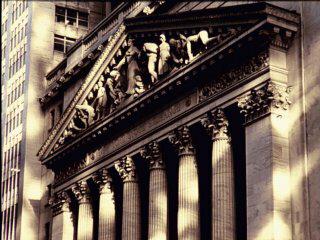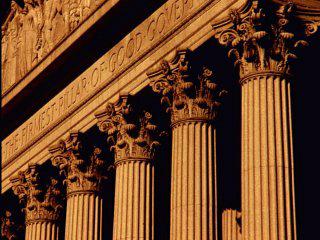The alleged 'corporate crime wave' the U.S. government is battling
is just a way to divert attention from the real wealth destroyer:
the U.S. government
Even before the carnage of the past week and yesterday, U.S.
government policy had destroyed US$5.6-trillion in U.S. stock
market wealth in a little more than two years -- or 33% of the
peak value (US$17-trillion) reached in March, 2000. Nearly
US$2-trillion has been destroyed in 2002 alone. Instead of
conducting a War on Terrorism, the U.S. government -- to the
applause of most economists, journalists and (yes) CEOs -- is
conducting a War on Business.
Nothing has yet been done to
eradicate or punish the Axis of Evil (Iraq - Iran - North Korea)
that was so ably identified by U.S. President Bush in January. In
its place is a new Axis of Evil: Accountants - Analysts - CEOs. It
should be obvious why both of these policies are harmful to the
stock market: The first continues to expose business to terrorist
attacks, while the second exposes it to an array of new regulatory
attacks. In Washington this summer, Congress was supposed to hold
hearings to investigate the foreign-military-security policy
breakdowns that permitted the destruction of Sept. 11. They lasted
all of two days. No one in government was fired, no one was fined
or jailed -- and focus was quickly shifted to alleged "corporate
crime."
The graph nearby gives a brief account of actual government
interventions that have been inflicted on markets since March of
this year. These and other interventions since March, 2000, are
the main cause of the destruction of trillions in corporate stock
values. Value destroyed due to corporate fraud -- say WorldCom's
US$3.8-billion in overstated earnings -- is but a tiny fraction of
this gargantuan, overall loss.
No major executive -- or even dozens of them -- can possibly
come close to destroying wealth on a scale that government can. We
suspect that most politicians know this all too well -- and that
their anti-corporate screeds are an attempt to issue a smokescreen
to deflect attention away from the real culprits (them). Nor has
any Federal Reserve official -- least of all Alan Greenspan --
been criticized or asked to resign for raising rates and trashing
markets. Nor has any U.S. trust-buster been called to account at
the so-called Justice Department; if anything, trust-busting has
intensified recently. Nor has anyone in the California state
government been held accountable for causing blackouts, losses and
bankruptcies.
The alleged "corporate crime wave" is nothing but a smokescreen
and a lie (but a dangerous one) to divert attention from the real
wealth destroyers. Since the stock market peak of March, 2000, --
a peak, by the way, which was shared by nearly all major stock
markets in the world -- the U.S. stock market (as measured by the
S&P 500), despite negative absolute returns, nevertheless has
outperformed seven other major markets. These include Japan,
Germany, Hong Kong, France, Sweden and Italy. And U.S. stocks have
only slightly underperformed stocks in Canada (by 0.1 percentage
points), Britain (by 2.2 percentage points) and the Netherlands
(by 3.2 percentage points).
If the real cause of U.S. shareholder wealth destruction is
"corporate fraud," or "dishonest accounting," or "incompetence" --
as so many claim -- one would have to conclude that fraud,
dishonesty and incompetence have occurred to a far greater degree
and in a far wider scope in these other countries, versus the
United States.
Below is a list of proposals that may be imposed on business
within the year. We rank these proposed interventions from most
egregious (bearish) to least egregious:
- Formation of a new Corporate Fraud Task Force, headed by the
deputy attorney-general of the United States (established on July
9 by an executive order of the President and described by him as a
"financial crimes SWAT team");
- Creation of a government-staffed and run Public
Accountability Board to oversee, micro-regulate and punish private
accounting firms;
- CEOs must vouch for the accuracy of their corporation's
financial statements, sign off on them and be held personally
liable for any "material" errors that might be uncovered later;
- Executives must be required to hold any stock (or stock
options) in the corporations they work for, for as long as they
work there;
- Corporate boards must include members who are "independent"
of the firm;
- The IRS is to investigate and subpoena accounting firms that
promote (legal) tax shelters for the wealthy;
- Jail terms for corporate fraud will be doubled, from five
years to 10 years;
- Increase the SEC's budget by 77%, to US$750-million, and
employ 100 additional SEC investigators and enforcement personnel;
- The IRS is to block reincorporations in "tax havens";
- Strip CEOs and executives who "abuse the trust of investors"
of all forms of recent compensation;
- Freeze the compensation of executives who are under any kind
of government investigation;
- Compel accounting treatment of stock options as a corporate
expense;
- Make the "improper" destruction of certain corporate
documents a crime;
- Compel CPA firms to divest consulting and tax advisory
practices;
- At brokerage firms, force a separation of research from
trading and investment banking, and impose greater government
censorship of research;
- Force the public disclosure of corporate tax records and
filings;
- Implement an SEC rule to more than triple the number of items
and events companies must disclose and to accelerate the timing of
those disclosures;
- Compel reporting of all transactions by "corporate insiders"
within two days;
- Prohibit corporations from making loans to executives;
- Deprive firms of federal contracts if they're under any
investigation or if they access tax havens.
The harsher and more comprehensive the eventual regulatory
assault on corporations, the more likely it is that the market
will remain depressed. The less severe and less comprehensive the
"reforms," the more likely it is the market will bottom out and
recover (but not quickly or robustly). The market already has, to
a large extent, discounted or "priced-in" the bulk of the (likely)
bad effects of the current proposals. But proposals could easily
become more punitive in the current congressional-regulatory
feeding frenzy. Corporate earnings in the United States already
bottomed out three quarters ago, but, as indicated above,
regulatory-political risk is undermining the quality of those
earnings. Even if earnings continue to increase (they will) and
even if they increase by as much as 25% over the coming year (as
is likely) stock prices will not increase by anything close to
that magnitude.
DOW JONES AVERAGE UNDER ATTACK:
MAR. 6 2002 Bush imposes steel tariffs
MAR. 22 Bush imposes lumber tariffs
APR. 25 AOL-Time Warner writes off $54-billion in goodwill
MAY. 3 O'Neill, in Congressional testimony, abandons strong
dollar policy
MAY 13 Bush signs farm subsidy bill, reversing free market
agenda
MAY 22 Merrill Lynch fined $100- million for analysts' faulty
forecasts
JUNE 4 Tyco Int'l CEO ousted for "tax evasion"
JUNE 17 Arthur Andersen is convicted of "obstructing justice" -
and dissipated
JUNE 20 FTC launches antitrust investigation against DRAM chip
makers
JUNE 21 SEC/Congress propose a partial nationalization of the
accounting industry and noncorporate directors
JULY 8 WorldCom executives grilled by Congress
JUL. 9 Bush proposes "crackdown" on "corporate fraud"
JULY 10 IRS sues KPMG and BDO Seidman to disclose tax shelter
advice
JULY 11 Republicans joint bill to jail CEOs
JULY 12 Congress assaults firms and shareholders for voting to
access tax havens, promises to block them
JULY 16 Greenspan decries "infectious greed"; Congress moves to
expand legislation on corporate crime
JULY 18 Congress agrees on $28.9- billion in new emergency
spending, increasing U.S. government deficit
JULY 22 Bush says WorldCom bankruptcy should push Congress to
take action on corporate crime
Source: Bloomberg News



